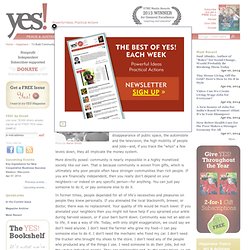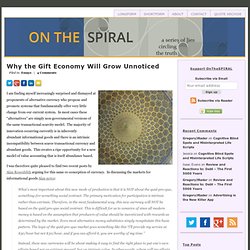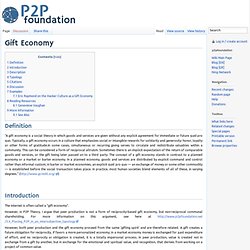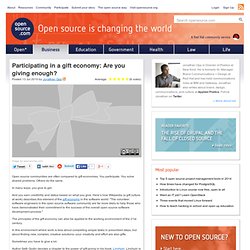

To Build Community, an Economy of Gifts by Charles Eisenstein. For a multitude of reasons, we need to need each other. posted Dec 27, 2011 Wherever I go and ask people what is missing from their lives, the most common answer (if they are not impoverished or seriously ill) is "community.

" What happened to community, and why don't we have it any more? There are many reasons—the layout of suburbia, the disappearance of public space, the automobile and the television, the high mobility of people and jobs—and, if you trace the "whys" a few levels down, they all implicate the money system. More directly posed: community is nearly impossible in a highly monetized society like our own. In former times, people depended for all of life's necessities and pleasures on people they knew personally. Because people in gift culture pass on their surplus rather than accumulating it, your good fortune is my good fortune: more for you is more for me. That is one reason for the universally recognized superficiality of most social gatherings. Interested? Case Studies [1]: Gift Economy and the Commons. Mutantspace www.mutantspace.ie Moray Bresnihan@ Mutantspace | Yuk Hui@DOXA YH: Can you explain to us what does mutantspace do?
![Case Studies [1]: Gift Economy and the Commons](http://cdn.pearltrees.com/s/pic/th/case-studies-economy-commons-21802876)
MB: What mutantspace does is give people free support in the production of their arts event and projects. We dont differentiate between the artist or non artist, professional or amateur, we just want people to play, create, make, experiment and fail. We are a non-monetary economy running everything on the gift economy principal – people join up by giving a skill into the bank. YH: What do you mean by ‘people join up by giving a skill to the bank’? MB: If you want to use the resources of mutantspace you simply register. Every member of mutantspace has given a skill into the bank. YH: Do members actively exchange skills through the platform? MB: Yes is the short answer as mutantspace provides a CONTACT tab on every skill so that you can directly email a fellow member – it is the only way to contact a member and it ensures privacy. MB: Finance doesn’t come into it. Why the Gift Economy Will Grow Unnoticed.
I am finding myself increasingly surprised and dismayed at proponents of alternative currency who propose and promote systems that fundamentally offer very little change from our current system.

In most cases these “alternatives” are simply non-governmental versions of the same transactional-scarcity model. The majority of innovation occurring currently is in inherently abundant informational goods and there is an intrinsic incompatibility between scarce transactional currency and abundant goods. This creates a ripe opportunity for a new model of value accounting that is itself abundance based. I was therefore quite pleased to find two recent posts by Alan Rosenblith arguing for this same re-conception of currency. In discussing the markets for informational goods Alan notes: What’s most important about this new mode of production is that it is NOT about the quid-pro-quo, something-for-something social contract.
Photo courtesy of seier+seier. Sacred Economics: Money, Gift, and Society in the Age of Transition (9781583943977): Charles Eisenstein. Gift Economy. "A gift economy is a social theory in which goods and services are given without any explicit agreement for immediate or future quid pro quo.

Typically, a gift economy occurs in a culture that emphasizes social or intangible rewards for solidarity and generosity: honor, loyalty or other forms of gratitude.In some cases, simultaneous or recurring giving serves to circulate and redistribute valuables within a community. This can be considered a form of reciprocal altruism.
Sometimes there is an implicit expectation of the return of comparable goods and services, or the gift being later passed on to a third party. The concept of a gift economy stands in contrast to a planned economy or a market or barter economy. The internet is often called a "gift economy". However, in P2P Theory, I argue that peer production is not a form of reciprocity-based gift economy, but non-reciprocal communal shareholding. The Wikipedia article on the Gift Economy is here, at Gifford Pinchot [1]: Eric Raymond [2]: Participating in a gift economy: Are you giving enough? Image by opensource.com Open source communities are often compared to gift economies.

You participate. You solve shared problems. Others do the same. In many ways, you give to get. And you earn credibility and status based on what you give. The principles of the gift economy can also be applied to the working environment of the 21st century. In this environment where work is less about completing simple tasks in prescribed steps, but about finding new, complex, creative solutions--your creativity and effort are also gifts. Sometimes you have to give a lot. Author Seth Godin devotes a chapter to the power of gift-giving in his book, Linchpin. Week 3: Property & Commons, and The Gift Economy.